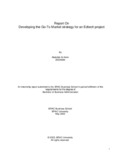| dc.contributor.advisor | Akhter, Rahma | |
| dc.contributor.author | Amin, Abdullah Al- | |
| dc.date.accessioned | 2024-01-10T03:41:04Z | |
| dc.date.available | 2024-01-10T03:41:04Z | |
| dc.date.copyright | 2023 | |
| dc.date.issued | 2023-05 | |
| dc.identifier.other | ID 20304084 | |
| dc.identifier.uri | http://hdl.handle.net/10361/22094 | |
| dc.description | This internship report is submitted in partial fulfillment of the requirements for the degree of Bachelor of Business Administration, 2023. | en_US |
| dc.description | Cataloged from PDF version of internship report. | |
| dc.description | Includes bibliographical references (page 57). | |
| dc.description.abstract | Bangladesh as a developing nation still has a long way to go in terms of initiating a widespread adoption of a digitally equipped online learning environment, however, the most inopportune of times brought forth by COVID-19 has exacerbated the importance of doing so in many different ways. Online learning platforms have become fairly common in the education landscape of Bangladesh and across the globe, which has spurred the growth in market readiness and acceptance towards online learning among students and other stakeholders alike. However, the shift from a completely traditional education system to a personalized and analytical form of blended learning is bound to be monumental for most consumer groups. The business model based on subscription behavior and consistent participation of all stakeholders is also difficult to mechanize and implement for startups with limited brand recognition. Therefore, a go-to-market strategy that accounts for all factors relevant to the shift in consumer behavior required for adoption of blended learning in an online ecosystem is the primary key to success for projects like Edventure and startups like Groundscrapers.
This report sheds an investigative light upon the process of developing an effective go-to-market strategy for Edventure where all factors pertaining to the expected changes in consumer subgroups are identified and accounted for through formulation of strategy. Secondary research on go-to-market strategies of recognized educational brands provides for the theoretical underpinning of the report, while firsthand experience and insights derived from the internship experience at Groundscrapers are the source of building blocks for the go-to-market strategy that was eventually developed for Edventure. Several market factors such as customer segments, geographic and psychographic traits of said segments, crucial customer pain points were thoroughly analyzed and eventual outputs such as pricing, distribution and sales strategies were developed and explained in elaborate details within the report. In a nutshell, the report is reflective of the immense learning outcomes achieved during the internship experience in terms of gaining practical insights on one of the burgeoning industries of Bangladesh, as well as the summative research on the process of developing an effective and all-encompassing go-to-market strategy for a budding EdTech project. | en_US |
| dc.description.statementofresponsibility | Abdullah Al-Amin | |
| dc.format.extent | 57 pages | |
| dc.language.iso | en | en_US |
| dc.publisher | Brac University | en_US |
| dc.rights | Brac University internship reports are protected by copyright. They may be viewed from this source for any purpose, but reproduction or distribution in any format is prohibited without written permission. | |
| dc.subject | Covid-19 | en_US |
| dc.subject | Go-to-market strategy | en_US |
| dc.subject | EdTech project | en_US |
| dc.subject.lcsh | Marketing strategy | |
| dc.title | Developing the go-to market strategy for an Edtech project | en_US |
| dc.type | Internship report | en_US |
| dc.contributor.department | Brac Business School, Brac University | |
| dc.description.degree | B. Business Administration | |

